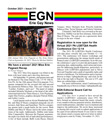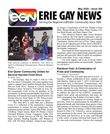New state historical markers to commemorate LGBTQ+ history
LGBT History Month is being celebrated with the unveiling and dedication of two new state historical markers on Sunday October 10 at 2 PM in Harrisburg. These are the first two markers with an LGBTQ+ history theme to be installed in Pennsylvania outside of the City of Philadelphia. The markers were approved earlier this year by the Pennsylvania Historical and Museum Commission. The ceremony will be held on the front steps of the Pennsylvania state capitol.
One of the historical markers honors Governor Milton J. Shapp and his administration for their pioneering achievements in public policy for LGBTQ+ people. The marker will be located on the edge of the state capitol grounds at the corner of Third and North Streets.
The other historical marker honors Richard Schlegel, a pioneering gay activist who was fired from both his federal and state jobs for being gay. The marker will be located in front of 205 State Street where Schlegel lived while a resident of Harrisburg.
In 1974, Gov. Shapp met with gay activist Mark Segal, which is believed to be the first meeting of a sitting governor with a gay activist. Shapp went on to appoint a task force in 1974 to study and advise him on improving public policy for LGBTQ+ people; issue an executive order in 1975 banning discrimination in employment for LGBTQ+ state employees, making Pennsylvania the first state in the nation to offer this protection; issue an executive order in 1976 formalizing the task force into the Pennsylvania Council for Sexual Minorities, making it the first official governmental body in the U. S. for improving public policy for LGBTQ+ people; and in 1976 issue the first Gay Pride Week proclamation by any governor in the U.S.
Richard Schlegel was born in Berrysburg and graduated from Penn State University and American University before settling into a federal job in Washington, D. C. in 1951. He became caught up in the Lavender Scare, an effort by Sen. Joseph McCarthy to rid the federal government of gay employees. Schlegel was investigated and fired for being gay. He took his appeal for reinstatement all the way to the U. S. Supreme Court and lost. But the arguments he made in his case have been cited as influential in subsequent case law in employment discrimination. Schlegel then took a job with the PA Department of Highways (now PennDOT) in 1963. He became active in the Janus Society, one of the first LGBTQ+ organizations in the state based in Philadelphia, and he established a central PA chapter of the group in 1964, the first LGBTQ+ organization in the central part of the state. The group held meetings at Schlegel's apartment at 205 State Street. He was investigated for his involvement in gay activism and fired from his state job. He later enjoyed a successful career in the private sector, then retired to Lewisburg and set up a foundation to benefit LGBTQ+ organizations.
Gov. Tom Wolf has been invited to speak, along with a representative of the Pennsylvania Historical and Museum Commission. Other featured speakers include gay activist and publisher of the Philadelphia Gay News, Mark Segal; and Robert Deibler, a member of the family of Richard Schlegel.
The LGBT Center of Central PA History Project is the sponsoring organization for the markers. A reception with cash bar at the 704 Lounge, 704 N. Third Street, will follow the ceremony.
ABOUT THE LGBT HISTORY PROJECT
The LGBT Center of Central PA History Project engages people in discovering, documenting, collecting, preserving and presenting the history of the LGBTQ+ community in central Pennsylvania through oral history and material culture. Started in 2012, the collection is housed at the Dickinson College Archives and Special Collections in Carlisle.
ABOUT THE LGBT CENTER OF CENTRAL PA
The LGBT Center of Central PA fosters inclusive communities and holistic well-being for LGBTQ+ people through social, educational, and cultural engagement. Established in 2006 and based in Harrisburg, the LGBT Center serves over 2,000 people each year across Dauphin, Cumberland, York, and Lancaster counties.





